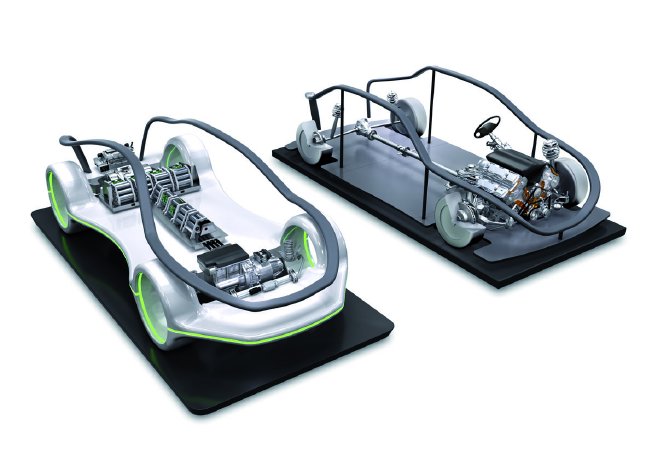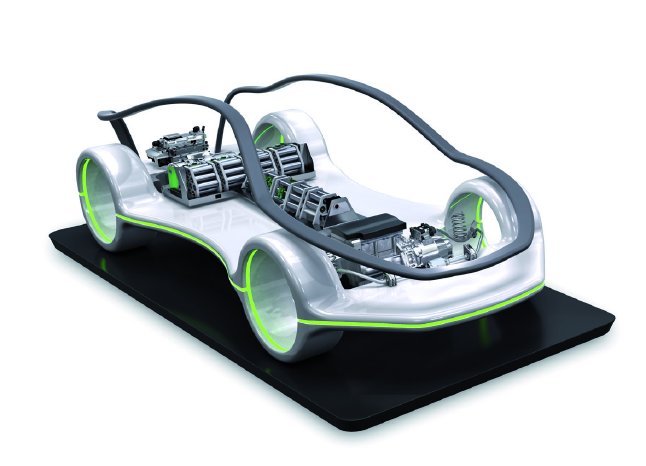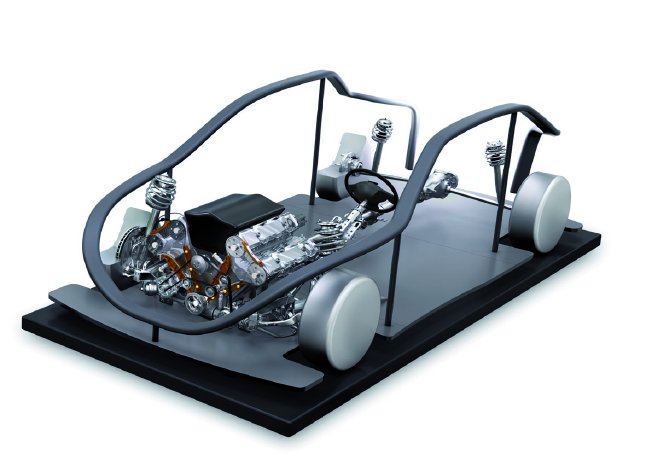- Mobility of the future will be driven by electric mobility and optimized internal combustion engines in equal measure
- Schaeffler creates solid foundation for electric mobility with its eMobility Systems Division and creates new jobs
- Schaeffler envisages potential for optimization in internal combustion engines of up to 30 percent
- Schaeffler makes decisive contributions to reducing fuel consumption and harmful substance emissions
- Schaeffler gains more than proportional benefit from the enduring trend in energy efficiency on its path of continuing growth
Schaeffler is presenting two concept studies at this year's IAA with the motto efficient future mobility. The two exhibits, called advanced Drive and eSolutions, provide a detailed insight into Schaeffler's extremely varied product range for energy-efficient and forward-looking mobility.
Based on the diversification strategy used by supplier to the mobility industry Schaeffler, these components for increasing efficiency cover a wide-ranging spectrum of modern automobility. This is because Schaeffler offers innovative solutions for optimizing the drive train based on combustion engines as well as key components for hybrid vehicles and advanced solutions for electric vehicles.
Accordingly, the eSolutions demonstration vehicle contains a large number of Schaeffler products that are relevant to the issue of electric mobility. These products include components that are suitable for use in hybrid and electric vehicles. "Electric mobility will make a significant contribution to driving our business", says Prof. Peter Gutzmer, Chief Technology Officer at Schaeffler. "Over 50% of all automobiles will have an electric drive in 2020. In addition, pedelecs (bicycles with electric power assistance), electric scooters and commercial vehicles with electric drives, widen the scope of electric mobility." Wheel hub drives such as Schaeffler's eWheel Drive, facilitate new vehicle architectures. The key parameters important for conventional drive trains with internal combustion engines are increasingly becoming significant for electric mobility. These include driving dynamics and safety as well as driving pleasure and reducing mass. The eDifferential from Schaeffler is a good example in this respect, since it enables so-called torque vectoring, which involves selective distribution of the drive torque thereby providing unique driving dynamics in electric vehicles.
In order to dedicate the appropriate attention to electric mobility, Schaeffler has now combined its activities in an eMobility Systems Division. The division has initially employed 300 people who are working solely in electric mobility on an international scale. In addition to the product range for electric and hybrid vehicles, at Schaeffler, the issue of electric mobility also involves considerations for the infrastructure associated with it. After all, the company has been one of the key suppliers to the wind power sector and other areas in renewable energy from the very beginning.
"In 2020 however, over 90% of vehicles will still have an internal combustion engine", says Prof. Peter Pleus, President of Schaeffler Group Automotive. "In most of these automobiles, internal combustion engines will continue to serve as the single or primary drive source or they will serve as range extenders. These internal combustion engines still have a great deal of room for improvement in terms of fuel consumption - up to 30% in practice."
When considering these improvements in detail, this potential can be achieved by optimizing the thermodynamics, minimizing pump losses and frictional resistance, using ancillary equipment controlled according to requirements, targeted thermal management, downspeeding, downsizing and the start-stop function. "The micro hybrid, that is the start-stop function, will feature in automobiles across the board in a very short time", says Prof. Pleus. "This system makes special demands of various components and we are prepared for these demands." Schaeffler's concept study called advanced Drive demonstrates this system and other products for the efficient drive of today and the future.
"The requirements that efficient and forward-looking mobility place on suppliers to the automobile industry involve increasing levels of complexity in components, modules and systems", explains Prof. Peter Gutzmer. "The continuing requirements in terms of energy efficiency mean that the focus is on reducing weight, optimizing friction and the increasing wide-ranging variability in the valve train."
Energy efficiency is deeply-rooted in the DNA of Schaeffler. Optimizing frictional resistance is the primary purpose of a rolling bearing. Reducing fuel consumption and emissions is the primary motivation of valve train components, which Schaeffler has been manufacturing for decades. The company's product range has long incorporated a wide variety of components, modules and systems that can significantly improve the fuel consumption and emissions of modern automobiles. This includes double-clutch solutions, dual mass flywheels and torque converters with centrifugal pendulum-type absorbers, electromechanical actuators, numerous solutions for variable valve trains, belt drives with optimized friction characteristics and other solutions for engines, transmissions and chassis. Sustained research and development activities in our global network of Schaeffler development centers enable the product range to grow on a continuous basis.
"With its efficient future mobility motto, Schaeffler continues to consistently pursue the path it has always traditionally taken", says Dr. Juergen M. Geissinger, President and CEO of Schaeffler.
"Schaeffler is in an excellent position in this respect. Activities such as setting up the eMobility Systems Division enable us to further develop our capacities in research and development as well as in manufacturing and allow us to orient ourselves towards the demands placed on us by the automobile of today and tomorrow. With a view to our innovative product range and the demands of global energy-efficient mobility, Schaeffler will gain more than proportional benefit from the growth in worldwide automobile manufacturing. Schaeffler is a global supplier of expertise for efficient future mobility."



